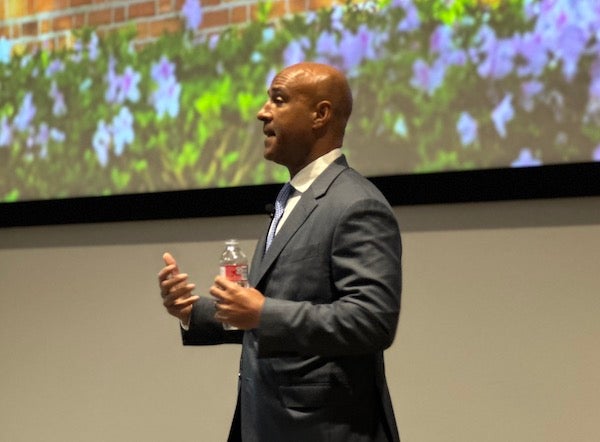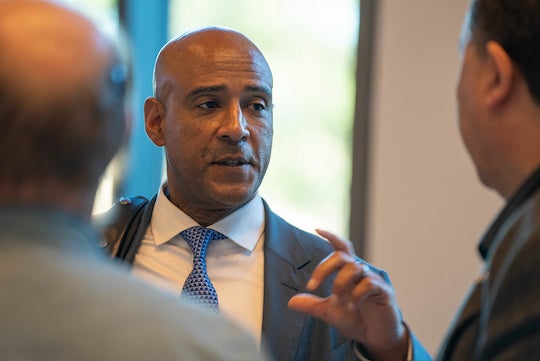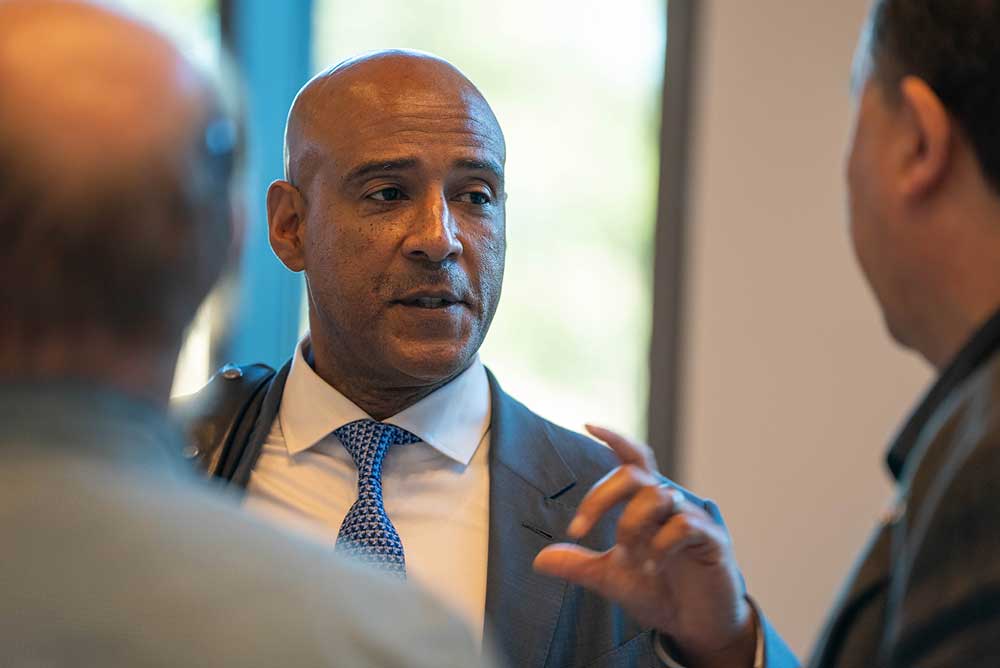Rice University’s dedication to equity and innovation will be taken to new heights going forward, President Reginald DesRoches said during his inaugural State of the University presentation to faculty Dec. 15.
“We will enhance our research enterprise while remaining committed to undergraduate education, growing improving graduate programs, and maintaining our commitment to diversity, equity and inclusion,” he told the audience gathered in the Glasscock School of Continuing Studies’ Hudspeth Auditorium.

While acknowledging the traditional “RICE” values — responsibility, integrity, community and excellence — DesRoches has added a few. “We have a number of guiding principles, many of which I've mentioned throughout the inauguration,” he said. “Have courage, curiosity (and) cultural care, which is so important in everything that we do.”
After recognizing the university’s new leadership team, DesRoches said Rice remains on solid financial footing with an endowment of $7.81 billion as of June 30 that provides 43% of the yearly budget. Philanthropy over the last two years has been at an all-time high, with Rice’s development team raising nearly half a billion dollars, while Rice alumni remain among national leaders in giving to their alma mater.
DesRoches said the university saw a dramatic increase in the number of applicants for the Class of 2022 — 31,443, an all-time high — with one of the lowest admit rates and highest yield rates among its peer institutions. He said Rice is one of the most diverse institutions among its Association of American Universities (AAU) peers and that it remains one of the most affordable members due in part to the Rice Investment.
Among the university’s ongoing goals is to increase the diversity of faculty, and DesRoches was happy to confirm that Rice plans to hire 200 faculty members in the near future. “We’ve made incredible strides in recent years in diversifying our faculty, and we all know how important (that) is, particularly for our huge body of diverse students.
“We’ve doubled, essentially, the percentage of African American or Black faculty at the university from 2% five years ago to 4%,” he said. “We’ve increased the percentage of Hispanic faculty from 6% 10 years ago to 8% today, so really, kudos to all those involved in faculty recruitment.” DesRoches said 20% of faculty in the last two rounds of hiring are from underrepresented groups, and that there are 55 active searches, all part of an effort to maintain Rice’s 6-to-1 ratio of students to faculty.
He said Rice’s growing community should reach parity between graduate students (currently 48%) and undergraduates (52%) by 2025, also in line with its AAU peers. Steady growth in graduate and undergraduate programs, including the addition of undergraduate majors in business, sports analytics, operations research, and managerial economics and organizational sciences, recognized the need for growth in programs to attract the nation’s top undergraduates.
DesRoches ran down 2022’s successes, including a record number of faculty achievements, including a MacArthur Fellowship “genius grant” to author Kiese Laymon, the Libbie Shearn Moody Professor and a professor of English; President Joseph Biden’s appointment of Ruth López Turley, director of the Kinder Institute for Urban Research, to the National Board for Education Sciences; and 13 National Science Foundation CAREER Awards to promising young faculty, also a record for Rice.

He was particularly proud of the fact that Rice scored an all-time high of 17 graduate students named 2022 Fellows of the National Graduate Education for Minorities Consortium, which creates opportunities for students to pursue career paths in industry or academia through connections with employers and universities. (DesRoches himself was a GEM Fellow.)
He mentioned the expansion of Rice Global to a new campus in Paris, “where we’re building on 20-plus years of our presence, started by the School of Architecture … to provide opportunities for the broader campus for our students to visit, but also for faculty to host conferences and workshops and to send student groups there.”
DesRoches expects to expand Rice’s presence in India, where an agreement is in place to grow an existing relationship with the Indian Institute of Technology Kanpur, as well as at the University of Edinburgh, Scotland, and in Argentina.
“We’re in a process now of trying to assess our global strategy to figure out what makes the most sense for Rice,” he said, adding that he prefers partnerships that are “deep, rather than broad,” and with universities that “provide the right opportunities for our students.”
DesRoches cheered the steady growth of Rice Online, which now offers four master’s degrees and a wide range of popular courses for college students and lifelong learners. He expressed pride in the university’s successful athletes, including the women’s soccer team, which went undefeated in its conference in 2022, the nationally ranked women’s volleyball team, the undefeated (so far) women’s basketball team and the football team on the eve of playing its first bowl game since 2014.
The president ran down the list of capital projects underway or in the planning stages as part of an updated campus master plan, noting progress on the Ralph S. O’Connor Engineering and Science Building, Cannady Hall and the Hanszen College wing replacement, all under construction. He expects ground to be broken for the Moody Center for Student Life and Opportunity in 2023.
He also noted the ramping up of innovation at The Ion Houston as well as Rice’s sustainability goals, with a drive to be carbon neutral by 2030, and a set of legislative and public policy challenges the university will face in the coming years.
In response to questions from faculty, DesRoches discussed opportunities to recruit Hispanic students from both South America and from the city of Houston itself, metrics to track the distribution of underrepresented minorities across departments and majors, and how efficiently Rice is adopting digital technologies.
The question that gave him pause, however, came from engineering colleague, Behnaam Aazhang, J.S. Abercrombie Professor of Electrical and Computer Engineering and director of the Rice Center for Neuroengineering: “What keeps you up at night?”
“Several things, probably,” he responded, mentioning the slight risk of the endowment-driven budget in an economic downturn and the constant demand for more space on campus.
“The other thing is just making sure we keep the best people at Rice,” DesRoches said. “I want to be sure we’re creating the environment here so that people want to come to Rice, but also want to stay and work at Rice.”

